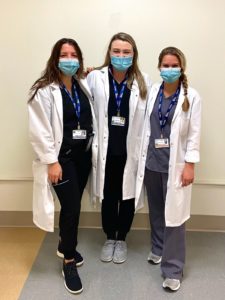Last March, we had the privilege of presenting at the ACHCA convention with one of our best friends, Alicia Cantinieri from Zimmet Healthcare to discuss the collaboration between speech language pathology and nursing, specifically to reducing and preventing rehospitalizations in skilled nursing facilities.
It was a terrific turnout, and the feedback was positive. Here were the key components from the session:
Multidisciplinary Collaboration is Critical.
We need to speak using words and phrases that we all understand. Speaking in a language we can all understand, clinicians and nurses need to use terminology that means the same thing to everyone involved. Specific to terms, using the correct language has the ability to improve clinical outcomes, ensure we have defensive documentation in place, and the correct terms are critical to reimbursement.
Speech Therapy: Impact on Hospital Readmission
Twenty percent of residents from skilled nursing facilities are re-hospitalized for pneumonia and approximately 21% of sepsis survivors will be readmitted within 30 days posthospital discharge. These are staggering numbers and the proper speech pathologist with the correct training can mitigate some of these instances.
A few of the risk factors include:
- Tracheostomy
- Prolonged recumbency
- Critical Illness
- General deconditioning and debility
- Poor Oral Care
- Dysphagia
- Neurological Disorders
- Dementia
- Parkinson’s Disease
- Respiratory Conditions (COPD)
In addition to preventing rehospitalizations, the collaboration between Speech and Nursing has the ability to mitigate facility tags such as, F692 Nutrition/Hydration Status Maintenance, F803 Menus Meet Resident Needs, F807 Drinks Available to Meet Resident Needs/Preferences/Hydration and F808 Therapeutic Diet Prescribed by Physician. Communication between Nursing and Speech allows for proper documentation and clear expectations not only by staff but clear understanding of the resident and family members as well.
Speech is tied to reimbursement.
Speech therapy is tied directly to the PDPM score Med A as well as, Med B revenues (Highest rate for all therapies). In addition, Speech is associated with cost reductions such as changing from altered diets and thickened liquids, reduction of tube feedings and supplement reduction. Also, there are several costs related to illness (i.e. Chest X-ray, antibiotics etc.) as well as the ability to reduce the burden on nursing staff.
Communication within the interdisciplinary team is crucial for positive resident outcomes, maximizing reimbursement through accurate documentation and decreasing hospital readmissions with targeted interventions. In summary, it is important to realize the need for investing in SLP services for optimal resident care and financial sustainability.



